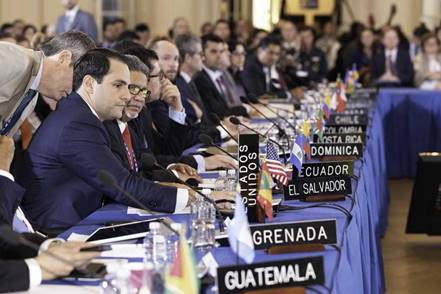
Ortega Grants Chinese Company a Huge Mining Concession

PUBLICIDAD 1M
PUBLICIDAD 4D
PUBLICIDAD 5D
Options under consideration are to create a “special commission” of 12 countries, blocking loans from the Inter-American Development Bank (IDB)

Daniel Ortega’s government could face in the coming days the creation of a “special commission” within the Organization of American States (OAS) or the freezing of loans from the Inter-American Development Bank (IDB), diplomatic sources informed the Spanish news agency EFE.
These are two of the actions that eight of the 34 countries that are active members of the OAS are considering: Canada, Mexico, Colombia, Chile, Peru, Brazil, Argentina and the United States. For now, the option that has gained the most strength is the creation of a “special commission” that would depend on the OAS permanent council and that would monitor the crisis in Nicaragua, the bloodiest since the eighties, with at least 300 deaths, according to figures from the Inter-American Commission on Human Rights (IACHR).
The creation of that “special commission” would be done through the adoption of a resolution, which could be voted on next week and would require the support of 18 countries. If the creation is approved, the commission would be comprised of a maximum of 12 member states and could designate a mission to visit Nicaragua; which would need the consent of the Nicaraguan president, Daniel Ortega, increasingly critical of the OAS.
Economic pressure on Ortega
According to diplomatic sources, another alternative is to increase economic pressure against Ortega by blocking IDB loans, which currently has an active portfolio of 624 million dollars for Nicaragua.
The IDB executive board, where its 48 members are represented, has the last word on suspending disbursements to a borrowing government and, so far, that issue regarding Nicaragua has not been discussed, said one of the organization’s spokespersons.
The last time the IDB temporarily froze funds to a country was in 2009, after the coup in Honduras that ousted Manuel Zelaya as president.
Apart from these two options, there is a third “tougher” way, which is being promoted by the United States and consists of the approval of a resolution to determine that in Nicaragua there has been “an alteration of the constitutional order”, which “seriously affects its democratic order”.
Applying the Democratic Charter
Such a declaration would initiate the application of the Inter-American Democratic Charter, which contemplates a gradual process in its articles 20 and 21, which goes from diplomatic efforts to, in case of failure, the suspension of Nicaragua from the OAS, which would keep it from participating in its programs and activities.
An initiative in the OAS already tried to suspend Venezuela from the organization but failed to obtain the 24 votes that are necessary.
The Colombian ambassador to the OAS, Andres Gonzalez Diaz, was the first one to publicly allude to the idea of the application of the Democratic Charter to Nicaragua, due to the possibility that one of its “backbones” has been violated, which is “the guarantee and respect for Human Rights.”
Gonzalez stated so on July 18, when the OAS passed a resolution condemning the violence in Nicaragua; and since then Washington has picked up the baton, although with a tougher stance, diplomatic sources said.
Several countries fear that the application of the Charter would end up “cornering” Ortega and cause him to deny a presence in Nicaraguan territory to the Inter-American Commission on Human Rights (CIDH), an autonomous body of the OAS that is playing a very important role in the national dialogue mediated by the Church.
“The feeling among some countries is that we do not want to be the ones who close that door,” summarized one of the sources consulted by EFE news.
The suspension is the highest form of punishment within the OAS and it has only been applied to two nations: Honduras, in 2009, after the coup against Zelaya; and Cuba after the triumph of Fidel Castro’s Revolution, in 1959.
This week marked a hundred days since the start of the protests against Ortega, a movement that started because of a highly unpopular social security reform, that, after a violent response by the government, quickly turned into a demand for his resignation, after 11 years in power.
Archivado como:
PUBLICIDAD 3M
PUBLICIDAD 3D